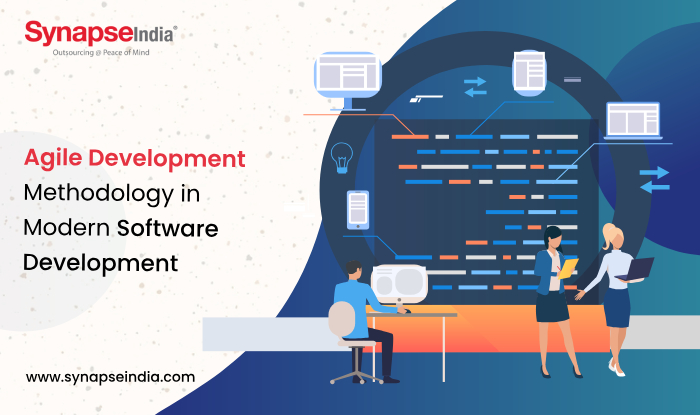 15 Jun 2024
15 Jun 2024“Agile Development Methodology is an iterative and flexible approach to software development that emphasizes customer-centricity, collaboration, and continuous improvement.”

In today's rapidly evolving digital landscape, the traditional approach to software development is no longer sufficient to meet the dynamic needs of businesses and users. Enter Agile Development Methodology, a revolutionary approach that emphasizes flexibility, collaboration, and iterative delivery to drive innovation and accelerate time-to-market. In this blog, we'll explore the principles, benefits, and best practices of Agile Development Methodology in modern software development.

Agile Development Methodology is a set of principles and practices designed to deliver high-quality software flexibly and iteratively. At its core, Agile is built on the values outlined in the Agile Manifesto, which prioritizes individuals and interactions, working software, customer collaboration, and responding to change over rigid processes and documentation.
Agile places a strong emphasis on collaboration with customers and stakeholders throughout the development process. By involving customers in the planning, feedback, and validation stages, Agile ensures that the software meets their needs and expectations.
Agile advocates for delivering software in small, incremental increments, known as iterations or sprints. This iterative approach allows for rapid feedback, continuous improvement, and the ability to adapt to changing requirements and priorities.
Unlike traditional waterfall methodologies, Agile welcomes change and embraces it as a natural part of the development process. Agile teams are encouraged to respond to changing requirements and feedback quickly, ensuring that the software remains relevant and valuable.
Agile teams are self-organizing and cross-functional, with the autonomy to make decisions and adapt to challenges as they arise. By empowering teams to take ownership of their work and collaborate effectively, Agile fosters a culture of accountability, creativity, and innovation.
Agile enables faster delivery of working software through iterative development cycles, allowing businesses to respond quickly to market demands and gain a competitive edge.
Agile provides the flexibility to adapt to changing requirements, priorities, and market conditions, ensuring that the software remains relevant and valuable throughout its lifecycle.
Agile promotes collaboration and communication among team members, customers, and stakeholders, fostering a culture of transparency, trust, and alignment.

By delivering working software in small increments and incorporating feedback early and often, Agile ensures higher quality outcomes that meet customer needs and expectations.
Agile focuses on delivering the highest business value with each iteration, maximizing return on investment, and driving continuous improvement and innovation.
Start by prioritizing user stories and features based on customer needs, business value, and technical feasibility. Focus on delivering the most valuable and impactful features first.
Break down work into small, manageable tasks or user stories that can be completed within a single iteration or sprint. This approach promotes efficiency, accountability, and progress visibility.
Implement continuous integration and delivery practices to automate the build, test, and deployment processes. This enables faster feedback, reduces integration issues, and accelerates time-to-market.
Encourage collaboration, communication, and feedback among team members, customers, and stakeholders. Create an environment where ideas are shared, challenges are addressed collaboratively, and feedback is incorporated iteratively.
Monitor progress regularly using Agile metrics such as velocity, burndown charts, and cycle time. Use this data to adapt plans, prioritize work, and identify opportunities for improvement.
Hold regular retrospectives at the end of each iteration or sprint to reflect on what went well, what could be improved, and what actions can be taken to enhance team performance and collaboration.
Embrace a mindset of continuous improvement and iteration, seeking feedback, experimenting with new approaches, and adapting processes to optimize efficiency and outcomes.
Agile Development Methodology has emerged as a game-changer in modern software development, enabling organizations to deliver high-quality software faster, adapt to changing requirements, and maximize business value. By embracing Agile principles, fostering collaboration, and following best practices, software development teams can drive innovation, accelerate time-to-market, and exceed customer expectations in today's competitive digital landscape. As businesses continue to evolve and embrace digital transformation, Agile Development Methodology will remain a cornerstone of success in modern software development.

